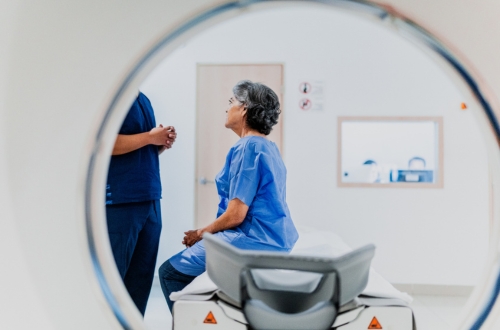Enhancing Oncology Clinical Trials with Medidata
The latest cancer data released earlier this year from the Global Cancer Observatory found that there were nearly 20 million new cases of cancer in 2022 alone, as well as almost 10 million deaths resulting from cancer. With the global incidence of cancer expected to rise to 35 million cases by 2050, there is a dire need for investments in disease prevention and novel treatment approaches. However, there are several challenges facing both clinical disease care and oncology clinical trials. These include an insufficient availability of effective cancer diagnostic tools, disparities in equitable accessibility to global resources, as well as the inherently complex nature of the disease posing difficulties with treatment development, among others.
Undoubtedly, the future of cancer research is dependent on increased collaborative efforts, and this is where technology providers like Medidata become crucial to enhancing oncology clinical trials. The company’s suite of advanced digital tools has become a necessity by providing a platform for integrating data from disparate primary sources, streamlining complex data and data quality management, as well as easier technology interoperability with scalability. In this article, we explore the impact of Medidata’s tools on furthering cancer treatments, exploring how these technologies are addressing both current and future challenges to enhance oncology clinical trials.
Read on to learn more!
Understanding the Role of Medidata in Clinical Trials
Medidata is a leading company in the digital transformation of life sciences, founded in 1999 by Tarek Sherif, Glen de Vries, and Ed Ikeguchi who aimed to create a platform that would transform the field of clinical trials. The collection of data in clinical trials was forever changed by the launch of Rave in June 1999, the first software to digitally collect trial data, which was renamed to Rave EDC (Electronic Data Capture).
Today, the Medidata Clinical Data Studio (formerly known as Medidata Detect) platform has added valuable clinical trial data management solutions such as eConsent (electronic consent), eCOA (electronic clinical outcome assessment), eCRF (electronic case report form), eSource (electronic source), as well as laboratory capabilities. It also provides a complete data quality solution through its RBQM (risk-based quality management) and Patient Data Surveillance in Medidata Surveillance.
The Medidata Clinical Data Studio platform was first adopted in November 2023 by TFS HealthScience, a leading CRO (Contract Research Organization), to improve data sharing efficiency and product development by leveraging its real-time data availability, easy data extraction, and streamlined data quality workflows. As of 2023, 25 years since its inception, Medidata achieved a significant milestone by becoming the first life sciences technology company to exceed 30,000 clinical trials supported by over 9 million study volunteers.
Improving Data Accuracy and Efficiency in Oncology Clinical Trials
Data accuracy and efficiency are two critical elements in oncology clinical trials, and Medidata Clinical Data Studio stands out as an advanced data and risk surveillance technology that functions to consolidate data from a multitude of sources into a single location. With cancer participants especially, there is health data to be collected from multiple clinicians and treatment locations, which must be reviewed and organized more coherently. Medidata’s data collection tools address this issue by not only merging data from various sources, but also arranging it in a way that facilitates greater accessibility and review for comprehensive patient safety surveillance. This, in turn, ensures the quality of data and the safety of patients throughout the course of oncology clinical trials.
Medidata‘s capabilities also enhance efficiency in oncology clinical trials by simultaneously managing data review, safety monitoring, risk management, site performance oversight, advanced analytics, and study level insights all in one location. For example, in their collaboration with Sanofi Vaccines, the Medidata eCOA solution was able to reduce study build times by up to 50% by providing an all-encompassing view of patient data with added convenience in reporting for participants. In addition to streamlining the data management process, these data collection tools from Medidata help sponsors and investigators transition from time-consuming on-site monitoring to cost-effective methods like risk-based monitoring in a remote or decentralized manner.
Enhancing Patient Recruitment and Retention with Medidata Clinical Data Studio
Several studies support the immense challenge patient recruitment poses for clinical trials, especially for cancer research. Specifically, one study assessing trials conducted in the United Kingdom found that only 55% of trials recruited their originally specified target sample size, 78% of the trials recruited 80% of the original target, and almost one-third of trials received an extension of some kind.
Recent advancements in technology offer valuable solutions to improve patient burden of trial participation to improve retention rates and enable longer-term data collection. One 2019 study found that 95% of patients were comfortable using a wearable device in a trial. Another study reported that patients who used ePRO technology from their own devices more frequently use remote monitoring tools in a trial and for longer periods, likely enabling higher quality data for sponsors. Based on these findings and many others, the Medidata Clinical Data Studio platform offers multiple solutions to help sponsors, CROs, and investigators navigate the inherent challenges of recruitment and retaining patients within oncology clinical trials.
myMedidata
This platform enables patients to virtually enroll and participate in clinical trials. By expanding access to its patient-centric solutions such as eConsent, eCOA, wearable biosensors, and LIVE video visits, Medidata creates a more accessible and intuitive interface for patients.
Medidata eConsent (formerly Rave eConsent)
This tool helps automate the patient enrollment process, thus reducing the administrative burden for sites and study teams in oncology clinical trials. It also improves overall consent tracking management, reduces informed consent errors, and allows patients to be onboarded directly into EDC.
Medidata Sensor Cloud
This solution is designed to boost patient engagement by using a less intrusive way to capture frequent, continuous, and objective data directly from the patient during oncology clinical trials.
Optimizing Trial Monitoring and Risk Management in Oncology Clinical Trials
Clinical trials in oncology are complex, requiring meticulous oversight and compliance with regulatory guidelines, which are supported by solutions provided by Medidata and Medidata Clinical Data Studio. The Medidata RBQM module enables proactive risk management for sponsors and CROs to identify and evaluate risks in oncology clinical trials promptly. The tool allows study teams to easily analyze data to determine if quality tolerance limits (QTLs) and key risk indicators (KRIs) are within range or need to be addressed. In place of the traditional reactionary approach to quality monitoring in a clinical trial, sponsors can take a robust proactive approach with Medidata RBQM.
Furthermore, communication is a key aspect of Medidata’s remote monitoring approach with solutions like the Remote Source Review, Medidata Clinical Data Studio, and the Rave TSDV (Targeted Source Data Verification). These tools assist sites and CROs in secure document acquisition, task workflow automation, and Source Document Review (SDR), saving time and costs while ensuring compliance and quality. Sponsors can also take advantage of real-time data flow, as well as instant access for monitors to SDV activities required at the study, site, and subject levels in oncology clinical trials.
Future Innovations in Oncology Clinical Trials with Medidata
In 2022, approximately 90% of all oncology approvals within the United States were clinical trials supported by Medidata software. Medidata’s vast experience, coupled with its extensive database across many different development programs and mechanisms of action, makes it a leader in promoting tech-based innovations in cancer research. For example, in a poster presented at the 2024 American Society of Clinical Oncology (ASCO) Annual Meeting, groundbreaking research from Medidata AI showed that a patient’s response to treatment over a short period could be linked to survival over a longer period. Not only could this potentially fast-track drug availability, but it also spells better access to new treatments sooner for cancer patients.
Another significant area of innovation is in the realm of data privacy, where medical imaging is increasingly being used in oncology clinical trials. To protect Personal Health Information (PHI), Medidata is developing algorithms that can automatically detect and remove PHI from Digital Imaging and Communications in Medicine (DICOM tags) and pixel data before it’s transmitted to other users.
Oncology clinical trials are also trending towards decentralized designs, which Medidata is helping lead the industry in through their decentralized clinical trials (DCT) program. Finally, real-world data (RWD) integration with Medidata’s Rave RWD platform enables oncology researchers to leverage electronic health records and insurance claims data to improve trial designs, enhance patient recruitment, and strengthen the generalizability of clinical trial results.
Conclusion
In conclusion, Medidata‘s advanced digital tools and platforms play a pivotal role in addressing the challenges in oncology clinical trials. Their solutions enhance data accuracy, efficiency, patient recruitment, and retention, while also optimizing trial monitoring and risk management. With ongoing innovations in areas such as AI, data privacy, decentralized trials, and real-world data integration, Medidata continues to set new standards in tech-based innovations for cancer research, paving the way for more effective and efficient cancer treatment development and patient care.
About TFS HealthScience CRO
TFS HealthScience is a global CRO that supports biotechnology and pharmaceutical companies throughout their entire clinical development journey. In partnership with customers across several countries worldwide, our customized approach is underscored by a deep commitment to understanding our client’s needs that sets us apart. As a trusted CRO partner throughout the entire clinical development journey, we understand the importance of providing diverse services to streamline clinical trials for our clients. Visit our website to learn more about the solutions TFS can offer for your next clinical trial, or connect with a TFS representative today!
Connect with Us
Contact us today to discover how TFS can be your strategic CRO partner in clinical development.



